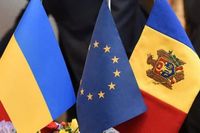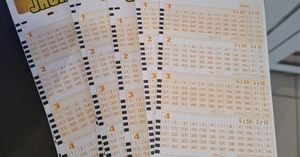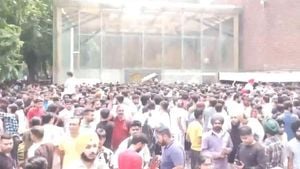The upcoming presidential elections in Romania are intensifying political debates, particularly as Bucharest's mayor, Nicușor Dan, prepares for a crucial second round on May 18, 2025. Dan, who has positioned himself as a pro-European candidate, will face off against ultra-right contender George Simion, who garnered over 40% of the votes in the first round held recently.
In an interview with Euronews, Dan emphasized his commitment to strengthening Romania's cooperation with the United States, stating, "I want Romania to maintain its Western, pro-European direction, and be active in the European Union." His statements come as the country grapples with significant political shifts, particularly following the annulment of the first round of presidential elections by the Constitutional Court due to allegations of electoral violations.
Dan’s platform is marked by a strong pro-European stance, especially concerning Ukraine. He expressed his desire for Ukraine to join the European Union, alongside the Republic of Moldova, saying, "If I become president, I will fight for this in European structures." This position sharply contrasts with that of Simion, who has been labeled as ultra-right and has faced restrictions on entering Ukraine and Moldova.
In discussing his vision for Romania's future, Dan highlighted the importance of maintaining good relations with the U.S. administration, specifically under President Donald Trump. He stated, "I want to see the strategic partnership with the United States continued and expanded. I would like American companies to have a greater presence in Romania," further emphasizing the need for American military presence in the country as a security guarantee.
However, the rise of Simion in the political landscape has raised questions about the effectiveness of Romania's traditional political class. "This is a failure of the traditional political class, which has been exploited by those who shout louder and have stronger populist ideas," Dan remarked, acknowledging the challenges posed by corruption that has persisted in Romania over the past decade. He pointed out that despite the doubling of GDP in that time, ordinary citizens have not seen improvements in their living conditions.
Dan's remarks reflect a broader concern about the functioning of the state apparatus, which he believes is evident to the public. Nevertheless, he remains optimistic, asserting that Romania has the resources to address these issues and guide the economy towards prosperity.
Meanwhile, the political dynamics in the European Union are also under scrutiny, particularly regarding the accession of Moldova and Ukraine. Lithuanian MEP Dainius Žalimas recently commented on the situation, cautioning against overestimating the implications of Hungary's veto, which may affect the EU's approach to these countries. He noted that Lithuania's experience shows that the timing of negotiations does not necessarily dictate the order of accession.
Žalimas pointed out that while Moldova has initiated its negotiations earlier than Ukraine, this does not guarantee an earlier membership. He emphasized that the official start of negotiations is merely a step forward, stating, "You should not be ahead of the official start of negotiations. It is an important step that testifies to progress, but it is possible to start negotiations in a year while preserving the prospect of joining the EU without additional delays, as happened with Lithuania."
Recent discussions have indicated that some EU member states remain committed to ensuring that Moldova and Ukraine are not separated in their accession paths, despite Hungary's veto. The most supportive EU members of Ukraine are reportedly unwilling to block Moldova's negotiations separately.
As Romania approaches its presidential elections, the outcomes will undoubtedly have implications not only for domestic policy but also for the broader geopolitical landscape in Eastern Europe. The contrasting visions of Dan and Simion reflect a nation at a crossroads, grappling with its identity and future direction in a rapidly changing Europe.
In summary, the upcoming election is not just a contest for the presidency; it is a pivotal moment for Romania, as it seeks to reaffirm its commitment to European integration and its strategic partnerships, particularly with the United States. As the campaign heats up, voters will have to weigh these critical issues against the backdrop of rising populism and the pressing need for reform.




